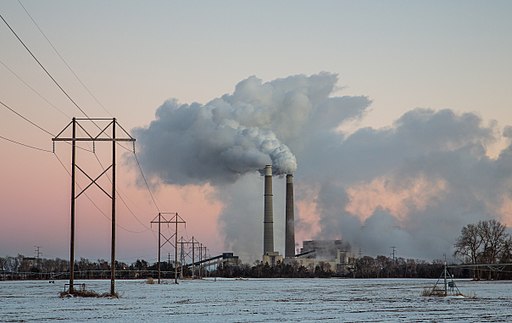“President Trump’s attempt to gut our nation’s Clean Power Plan is foolish. It’s also unlawful.”
By Jessica Corbett, staff writer for Common Dreams. Published 8-13-2019

Xcel Energy’s Sherburne County (Sherco) Generating Station, a coal-fired power plant, near Becker, Minnesota. Photo: Tony Webster/Wikimedia/CC
A coalition of 22 states and seven major American cities sued the Trump administration Tuesday over its repeal of the Obama-era Clean Power Plan and a replacement that critics have dubbed the “Dirty Power” rule.
The lawsuit (pdf), filed in the U.S. Court of Appeals for the District of Columbia Circuit, targets the administration’s so-called Affordable Clean Energy (ACE) rule, which eases restrictions on coal plants imposed by the Obama plan, the first national policy to limit power plants’ carbon emissions.
Shortly before Environmental Protection Agency Administrator Andrew Wheeler, a former coal lobbyist, signed the ACE rule in June, the administration attempted to bolster the case for its plan by, as Common Dreams reported, “effectively rescinding the EPA’s own estimate that it could lead to 1,400 premature deaths per year.”
Critics of the Trump plan warn of its anticipated effects not only on people but also the planet, which is rapidly warming as a result of human activity.
“The science is indisputable; our climate is changing. Ice caps are melting. Sea levels are rising. Weather is becoming more and more extreme,” New York Attorney General Letitia James, who is spearheading the suit, said in a statement Tuesday. “Without significant course correction, we are careening towards a climate disaster.”
“Rather than staying the course with policies aimed at fixing the problem and protecting people’s health, safety, and the environment, the Trump administration repealed the Clean Power Plan and replaced it with this ‘Dirty Power’ rule,” said James. “My office, and this groundbreaking coalition of states and cities from across the nation, will fight back against this unlawful, do-nothing rule in order to protect our future from catastrophic climate change.”
BREAKING: We filed a lawsuit against the Trump Admin’s @EPA over its Affordable Clean Energy rule.
The science is indisputable; our climate is changing. Ice caps are melting. Sea levels are rising. Weather is becoming more and more extreme.
That’s why we are fighting back. pic.twitter.com/jva7jxLQGX
— NY AG James (@NewYorkStateAG) August 13, 2019
James was joined by the attorneys general of California, Colorado, Connecticut, Delaware, Hawaii, Illinois, Maine, Maryland, Massachusetts, Michigan, Minnesota, New Jersey, New Mexico, North Carolina, Oregon, Pennsylvania, Rhode Island, Vermont, Virginia, Washington, Wisconsin, and the District of Columbia as well as the chief legal officers of Boulder, Chicago, Los Angeles, New York City, Philadelphia, and South Miami.
California Attorney General Xavier Becerra, in a statement Tuesday, specifically called out President Donald Trump for his administration’s coal-friendly plan.
“President Trump’s attempt to gut our nation’s Clean Power Plan is foolish. It’s also unlawful,” Becerra said. “His fossil fuel protection plan fails everyone who stands for cleaner air. And it fails our economy, which depends on clean energy now more than ever.”
“We know what our energy future must look like, and we won’t get there by following President Trump’s misguided proposal,” he added. “Because we’re prepared to confront the climate crisis head-on, we’re prepared to confront President Trump head-on in court.”
The states and cities aren’t alone in legally challenging the Trump rule, The New York Times reported Tuesday.
A coalition of environmental groups including the Natural Resources Defense Council, the Sierra Club, and the Environmental Defense Fund are expected to file their own legal challenge this week.
Two leading public health groups, the American Public Health Association and the American Lung Association, have already filed suit to block the Trump administration plan.
The cases could ultimately reach the U.S. Supreme Court—which, if the justices ruled in favor of Trump’s EPA, could have sweeping implications for future efforts to implement federal restrictions on the energy industry.
“It would have a devastating effect on the ability of future administrations to regulate greenhouse gases under the Clean Air Act,” Richard L. Revesz, a professor at New York University who specializes in environmental law, told the Times. “It would essentially make it extremely difficult to regulate greenhouse gases effectively.”

